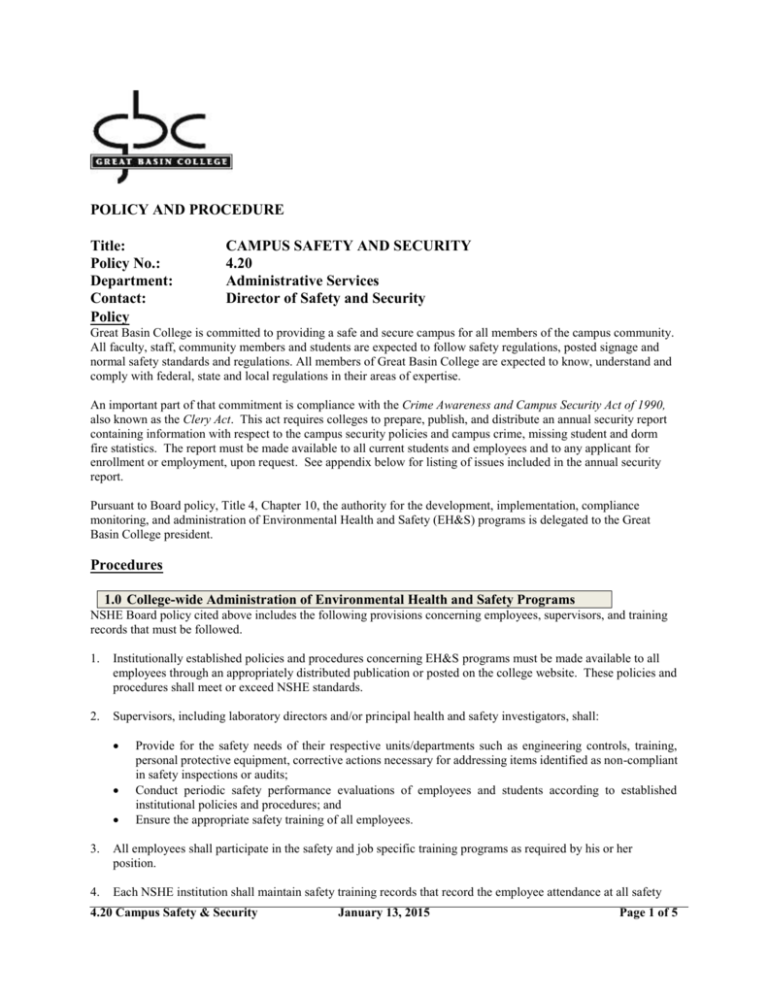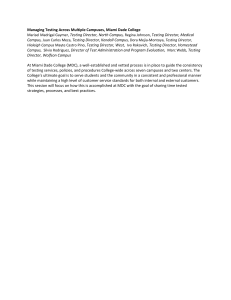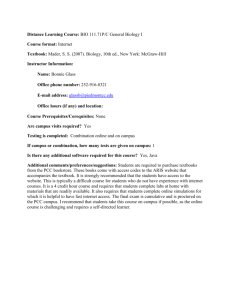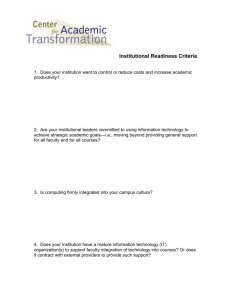Campus Safety and Security
advertisement

POLICY AND PROCEDURE Title: Policy No.: Department: Contact: Policy CAMPUS SAFETY AND SECURITY 4.20 Administrative Services Director of Safety and Security Great Basin College is committed to providing a safe and secure campus for all members of the campus community. All faculty, staff, community members and students are expected to follow safety regulations, posted signage and normal safety standards and regulations. All members of Great Basin College are expected to know, understand and comply with federal, state and local regulations in their areas of expertise. An important part of that commitment is compliance with the Crime Awareness and Campus Security Act of 1990, also known as the Clery Act. This act requires colleges to prepare, publish, and distribute an annual security report containing information with respect to the campus security policies and campus crime, missing student and dorm fire statistics. The report must be made available to all current students and employees and to any applicant for enrollment or employment, upon request. See appendix below for listing of issues included in the annual security report. Pursuant to Board policy, Title 4, Chapter 10, the authority for the development, implementation, compliance monitoring, and administration of Environmental Health and Safety (EH&S) programs is delegated to the Great Basin College president. Procedures 1.0 College-wide Administration of Environmental Health and Safety Programs NSHE Board policy cited above includes the following provisions concerning employees, supervisors, and training records that must be followed. 1. Institutionally established policies and procedures concerning EH&S programs must be made available to all employees through an appropriately distributed publication or posted on the college website. These policies and procedures shall meet or exceed NSHE standards. 2. Supervisors, including laboratory directors and/or principal health and safety investigators, shall: Provide for the safety needs of their respective units/departments such as engineering controls, training, personal protective equipment, corrective actions necessary for addressing items identified as non-compliant in safety inspections or audits; Conduct periodic safety performance evaluations of employees and students according to established institutional policies and procedures; and Ensure the appropriate safety training of all employees. 3. All employees shall participate in the safety and job specific training programs as required by his or her position. 4. Each NSHE institution shall maintain safety training records that record the employee attendance at all safety 4.20 Campus Safety & Security January 13, 2015 Page 1 of 5 training activities. These records will be maintained in the safety department. These records shall be open to inspection by regulatory inspectors and NSHE employees, including EH&S and human resources personnel. 2.0 General Safety Procedures (All Employees) All Areas. It is the responsibility of supervisors and instructors to notify employees and students of the emergency evacuation map for their area, the location of the nearest fire alarm, and the location of the nearest fire extinguisher. Also, the location, proper use and handling of any potentially hazardous or dangerous equipment or materials in any setting should be reviewed the first time employees and students are present in the same setting with these items. A review of all required safety equipment, eye-protection, hearing protection, clothing, and general safety procedures must be included. Equipment Safety. Faculty members are expected to include instructions on the proper and safe use of all equipment to all students during the beginning of each semester. During any class or lab time it is the responsibility of the instructor to supervise the use of all equipment and ensure that students are using all safety equipment properly. Hazardous Materials. Great Basin College follows the recommendations of the Federal Patriot Act, which include the securing of all labs and chemical storage areas when an instructor or lab assistant is not present. At the beginning of each semester faculty members in lab courses must give a safety review if hazardous materials are present. This review must also include explanation of all appropriate first responses to spills, fire, and direct exposure. The faculty should not permit students into lab areas except during scheduled class and lab times, unless prior arrangements have been made to ensure the safety of the student and the security of the equipment and chemicals. To provide for the safety of all students, no student should be permitted to work alone in a lab where hazardous materials are located. Reporting Unsafe Conditions. Every employee of Great Basin College is responsible for taking note of any unsafe conditions and reporting them by one of two methods, depending on the gravity of the situation or condition. First, if the unsafe condition is an immediate injury or life threatening situation, security and/or buildings and grounds or the campus director should be notified immediately by phone or by using one of the radio call boxes on the Elko campus. Second, all other unsafe conditions should be noted on buildings and grounds work orders so that repairs may be scheduled as soon as possible. All accidents and incidents should be reported immediately to the security department or campus director for assistance and documentation. The respective vice presidents should be notified for the departments and staff involved. Secure Use of Keys. See Human Resources policy, Key Control. 3.0 Access to Campus Facilities Great Basin College maintains open campuses available to faculty, staff, students and the local community during normal hours. During those days and hours classes, meetings and special events are scheduled security will have staff on campus to provide assistance. Open access to campus facilities is provided with the understanding that: All persons will be treated with courtesy and respect; All buildings and equipment are used in the manner originally anticipated; All persons will comply with any posted signage; All persons will follow normally accepted safety and behavior standards. The offer of open access may be revoked should any person be found to cause damages to any Great Basin College property or be involved in harmful, unsafe or illegal behavior while on campus property. All labs (science, technical arts, and art) should be secured when scheduled classes are not in session. When faculty for any of the labs schedules open study times, either faculty or a student assistant must be present to ensure the safety of all students. 4.20 Campus Safety & Security January 13, 2015 Page 2 of 5 4.0 Alcohol and Illegal Substances Use, Sale and Possession of Alcoholic Beverages. Alcohol will only be permitted on the Great Basin College campus and properties when pre-approved in writing by the president for a specific event. During that event alcohol will only be served to those persons presenting verification they are of legal drinking age in Nevada. The Board of Regents Handbook, Title 4, Chapter 20, Section 4, states the NSHE alcoholic beverage policy and mandates disciplinary action against any student who exhibits offensive behavior on NSHE-owned or supervised property while under the influence of alcoholic beverages. Legal action may take place concurrently with campus disciplinary action. Great Basin College complies with the Drug-Free Schools and Communities Act. Anyone wishing to receive information on substance abuse or alcohol abuse should contact the admissions advising and career center in Berg Hall. The Great Basin College library also maintains a collection of information available to everyone on substance abuse and alcohol abuse. Policy Regarding the Use, Sale and Possession of Illegal Drugs. Great Basin College maintains a zero tolerance position with regard to the use, sale and possession of any illegal drug. Violation of any state or federal drug laws will subject the student to disciplinary action, which may include legal action concurrently. Illegal use or abuse of legal and/or prescription drugs will subject the student to similar disciplinary action. Possession and Use of Medical Marijuana. The Nevada System of Higher Education is sympathetic to the medical needs of our students, employees and visitors. A growing number of states, including Nevada, are enacting laws decriminalizing or legalizing the use, possession, delivery, manufacture, growth, distribution, production, and/or cultivation (hereinafter “use”) of medical marijuana. Federal law prohibits the use of medical marijuana on college and university campuses that receive federal funding. The following provisions shall govern the possession and use of medical marijuana on NSHE property. 1. The use, possession, or cultivation of marijuana, including for medical purposes, on any NSHE or NSHE foundation owned or leased property, or at any NSHE sponsored or authorized activity, is expressly prohibited. 2. Students, employees, faculty, guests, and/or visitors who violate this policy are subject to applicable disciplinary, legal and/or administrative action. 3. Each institution shall permit students who live on-campus or in housing that is owned or operated by the institution, to petition (“request”) for a release from the housing contract if they assert legal compliance with Nevada state law to use medical marijuana. Such students, who prove their compliance with state law, may, in accordance with the applicable institution refund policy, be released from their housing contracts and may receive a prorata refund of housing fees or rent paid. 4. Each institution shall publish on its website and in its course catalog notice of the prohibited use, possession or cultivation of medical marijuana on NSHE or institution property in accordance with the provisions of this section and as prohibited student conduct defined in Title 2, Chapter 10. 5. The Board of Regents recognizes the Nevada Legislature’s stated commitment to a program evaluating the medical use and distribution of medical marijuana to be conducted by the University Of Nevada School Of Medicine. Any NSHE institution may engage in medical marijuana research that is conducted in accordance with state and federal laws and regulations, provided that the following are obtained: (a) the prior written consent of the president of the institution, after consultation with the institution’s general counsel; and (b) legal authorization from the proper federal authorities for approved research purposes. 5.0 Law Enforcement on Campus Properties Security and law enforcement on all Great Basin College campuses is dependent upon GBC personnel working well with their respective local law enforcement agencies. Knowledge of any crime or emergency should be reported to the campus security or campus director immediately. Any crime or emergency requiring immediate assistance should be reported immediately to the police or sheriff by dialing 9-911 on any campus phone. 4.20 Campus Safety & Security January 13, 2015 Page 3 of 5 Great Basin College campuses are not staffed with P.O.S.T. certified officers. The Elko campus does have security officers and when security is not on duty, City of Elko Police or Fire Department should be called to respond to emergency calls. Security officers function as representatives of college administration who are assigned to keep the campus safe and secure. Officers will handle and document routine situations and incidents on the campus including, but not limited to, securing of offices and buildings, noise complaints at the dorms, control of crowds for special events and concerts, lost property, vehicle accidents, medical calls and assistance to faculty and students. 6.0 Reporting of Criminal Actions or Emergencies Any member of the campus community observing any criminal action or an emergency occurring on any portion of the campus property is responsible for immediately reporting the situation to the security department or campus director. Security may be contacted by dialing the Elko campus operator (Dial "0") from any campus extension and requesting assistance. On the Elko campus assistance may be obtained by activating any of the call boxes located on the campus pathways or phoning the security cell phone at 934-4923. If the police department, fire department or ambulance are required dial, 9-911 from any campus extension and tell the dispatcher of the emergency. On the Elko campus for non-emergency reports, security is available seven days a week during the semester. Contact the campus operator and request that security respond for a report. On the Ely, Battle Mountain, Pahrump, and Winnemucca Campuses, non-emergency reports may be filed with the campus directors during normal business hours. All reports, once written, are forwarded to the director of safety and security for review. The director of safety and security will be responsible for any investigation required and for advising the appropriate vice president or dean of the incident. In addition, the director will be responsible for any coordination that should be required with the police department or sheriff’s department. 4.20 Campus Safety & Security January 13, 2015 Page 4 of 5 References: NSHE Title 4 Chapter 1, Section 12, Police & Security Chapter 10, Section 27, Environmental Health & Safety Chapter 20, Section 4, Alcohol Beverage Policy Chapter 10, Section 1, Environmental Health and Safety (EH&S) programs (new 12/0) Crime Awareness and Campus Security Act of 1990 http://www.securityoncampus.org/newregs/66846.htm (This includes the updates effective 2010) Revision approved by President’s Council: March 21, 2007, July 14, 2009, November 9, 2010, January 13, 2015 Contact the assistant to the president for any questions, corrections, or additions. 4.20 Campus Safety & Security January 13, 2015 Page 5 of 5





